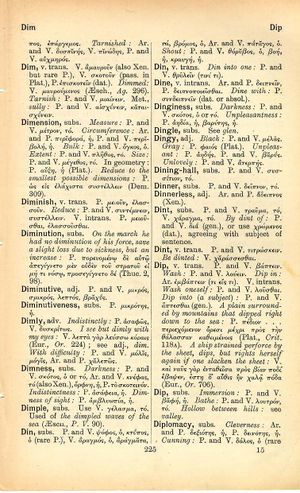dint: Difference between revisions
From LSJ
Εὐφήμει, ὦ ἄνθρωπε· ἁσμενέστατα μέντοι αὐτὸ ἀπέφυγον, ὥσπερ λυττῶντά τινα καὶ ἄγριον δεσπότην ἀποδράς → Hush, man, most gladly have I escaped this thing you talk of, as if I had run away from a raging and savage beast of a master
(CSV3) |
m (Woodhouse1 replacement) |
||
| Line 1: | Line 1: | ||
{{Woodhouse1 | {{Woodhouse1 | ||
|Text=[[File:woodhouse_225.jpg|thumb|link={{filepath:woodhouse_225.jpg}}]] | |Text=[[File:woodhouse_225.jpg|thumb|link={{filepath:woodhouse_225.jpg}}]] | ||
===substantive=== | |||
P. and V. [[τραῦμα]], τό, V. [[χάραγμα]], τό. | [[prose|P.]] and [[verse|V.]] [[τραῦμα]], τό, [[verse|V.]] [[χάραγμα]], τό. | ||
[[by dint of]]: [[prose|P.]] and [[verse|V.]] [[διά]] (gen.), or use [[χρώμενος]] (dat.), [[agreeing with subject of sentence]]. | |||
===verb transitive=== | |||
P. and V. τιτρώσκειν. | [[prose|P.]] and [[verse|V.]] [[τιτρώσκειν]]. | ||
[[be dinted]]: [[verse|V.]] [[χαράσσεσθαι]]. | |||
}} | }} | ||
Revision as of 08:56, 20 May 2020
English > Greek (Woodhouse)
substantive
P. and V. τραῦμα, τό, V. χάραγμα, τό.
by dint of: P. and V. διά (gen.), or use χρώμενος (dat.), agreeing with subject of sentence.
verb transitive
P. and V. τιτρώσκειν.

